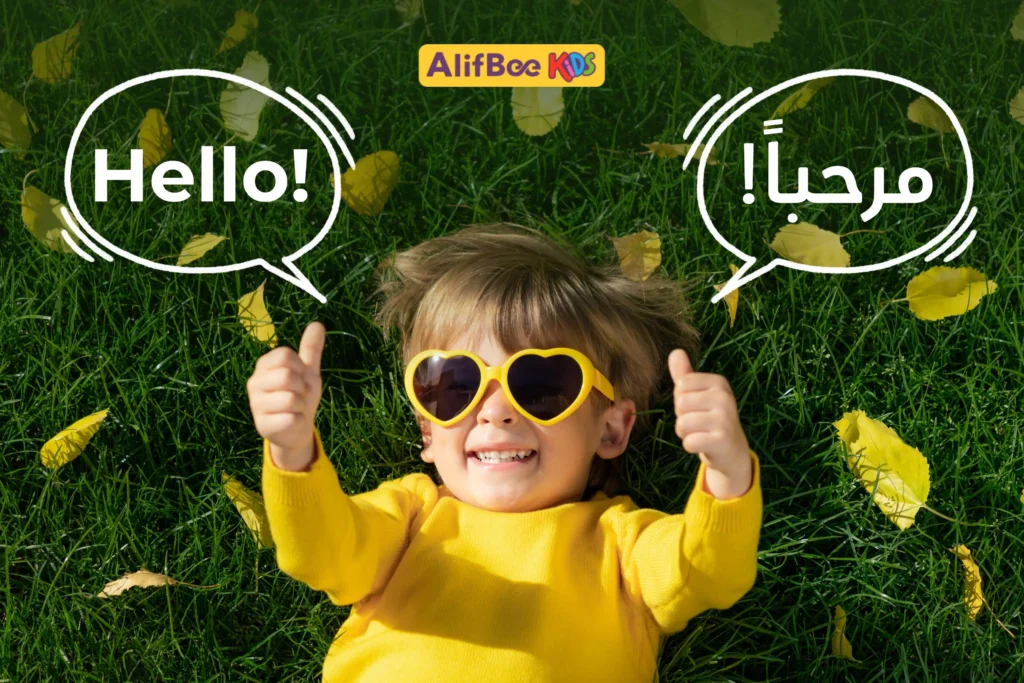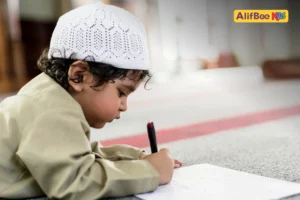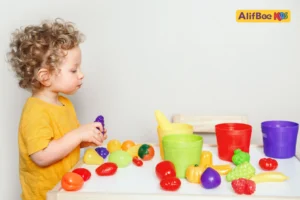Learning two languages at once, benefits of bilingualism
Are you a global citizen whose roots are far away from the fruits? Have you googled how to raise bilingual children a thousand times and got lost in the process? This blog post will answer all your questions and conquer your fears through evidence-based information.
How to Raise Bilingual Children: 7 Common Fears (and Why You Shouldn’t Worry)
If you are an Arab parent living abroad, one of the greatest fears that may be occupying your thoughts is raising bilingual kids. Will they refuse to learn Arabic? Have you thought about how to raise a bilingual child in a monolingual household? Does bilingualism cause confusion, teaching Arabic and English? Will they speak both languages fluently? Will one language affect the other and give it an accent?
Your questions are valid. But rest assured, you are not alone. Millions of Arab parents have the same fears whether they immigrated to the U.S. or Canada, decided to move to another country early in life, or even stayed in an Arab country and enrolled their kids in international schools. All these parents share the same fears and many of them figured the way out of this “problem”, because by the end of this article you will realize it is not even a problem.
Is Raising a Bilingual Child Too Hard?
Let’s take your mind from over-thinking to positive thinking. In the next few paragraphs, you will learn that what you have always thought was a problem is indeed a great opportunity for your family to flourish.
Let’s beat the monsters in your head, one by one.
Fear 1: Will My Child Get Confused Learning Two Languages at Once?
The short answer to this question is NO.
Children copy their parents more than we can ever imagine. So, if the child’s parents or community mix languages up, then he will learn the pattern and copy it. Your only role to avoid this problem is to avoid mixing languages. Use both, but make sure to use each separately. If you see your child alternate languages in one sentence, rest assured. This is called “code switching”. It only means that this bilingual child is fluent in both languages and speaks both languages comfortably. Code switching in kids was proven to not only be harmless but to also have cognitive benefits as stated by the World Humanitarian Movement
These children operate two systems simultaneously. They choose to suppress one language and use the other, then in less than a second, they reverse the system to be able to express themselves efficiently. This is a great mental exercise that they practice as it teaches them to be flexible and to adapt to every situation.
Fear 2: Does Speaking Two Languages Cause Speech Delays?
Variations in early speech milestones are totally normal, and you don’t have to relate every “delay” in your children’s speech progress to bilingualism. Even if a bilingual kid appears slower in each language, that doesn’t mean he is behind overall. It just means that he was less exposed to this language.
As stated in the must-read guide released by McGill University “a short guide to raising children bilingually”, Research shows that bilingual children go through most of the major milestones in language development at the same age as monolingual children, under the condition that they are given adequate exposure to both languages.
Bilingualism was proven to support brain growth in early childhood. Managing two languages at once also needs a great deal of attention, so kids who switch languages often practice concentration without you noticing it, which reflects on their academic progres. “a short guide to Raising Children Bilingually”
Fear 3: Is It Normal for Bilingual Children to Mix Languages?
Language blending is a natural process. We have to admire it and accept it rather than scold our kids for it.
1- Always remind yourself that this child did not choose to be a part of two cultures. We did it, and it is for their best.
2- Speaking two languages means much more than spoken words. It means that this little child knows where they come from and cherishes that heritage. It means that they are aware of their surroundings and have adapted to them. This is a little person with a big brain, able to understand cartoons, books and movies in both languages. This is a person that will have the potential to dream big and think big.
3- You are the role model. If language blending causes you, or your child, any problems, gently draw their attention to it. Let them know that it is normal but that it is not the best practice.
Fear 4: Why Doesn’t My Child Want to Speak Arabic?
Language dominance refers to the situation in which one language is more proficiently used than another, either by an individual or within a community. If your bilingual child is exposed to the Arabic language less than 30% of their total language exposure, then they may not fully acquire the language.
- One method to overcome this challenge is using the OPOL strategy. The One Person, One Language is a common bilingual parenting approach in which one caretaker speaks to a child in one language, while a second person speaks to the child in another language. This guarantees adequate exposure to both languages almost equally.
- You don’t have to be the only source of exposure to Arabic. You can encourage your kid to enjoy Arabic through engaging sources, like the AlifBee Kids app, stories, games or songs.
· Let them know that Arabic is the method to communicate with extended family otherwise you won’t be able to get your cousin’s jokes or listen to grandma’s interesting stories.
Fear 5: Can I Raise a Bilingual Child If I’m Not Fluent in Arabic?
You are the main pillar of your child’s personality and education, but not the only one. As the old saying goes, it takes a village to raise a child. You are already doing a great job by giving your child access to learn the Arabic language that will open doors for reading creative stories, getting to know about other cultures and knowing how other people think and live.
- Start with yourself. Gently start using the Alifbee app for easy stress-free progress.
- Make family connections fun. Video calls with extended family are always a fun idea. You will be giving your child the opportunity to connect with their family, learn about them and practice their Arabic language skills all in a fun setting.
· Use screen time wisely with Alifbee Kids. If screen time is inevitable, then better use it to learn something new. The AlifBee Kids app is designed to teach the Arabic language to kids in a smooth and colorful way that will grab their attention.
Fear 6: Is It Too Late to Start Teaching My Child Arabic?
Your child’s bilingual journey can begin before they are born. To be honest, the earlier you start, the better the outcome. It is a good choice to know what the best age is to start learning Arabic as a kid.
However, there is definitely no deadline, or else how would so many adults learn new languages?
Stay focused and determined. If you are reading this today, you are already taking the very first step to a glorious decision. Teaching your child Arabic today will not only keep him connected to his roots and enhance his personality and flexibility, but it can also be the reason why he lands his first job without having to wait too long. Being bilingual is a huge plus in today’s highly competitive market. From translation to diplomacy, healthcare, and tech, bilingual adults enjoy more career choices and perks.
Fear 7: Will Bilingualism Affect My Child’s School Performance?
Bilingualism is a strength, not a handicap!
Bilingual kids often show enhanced academic performance thanks to their mental flexibility, attention control, and ability to process complex ideas. Being bilingual actually strengthens the skills that lead to academic success.
Start wrapping the greatest gift you are about to present to your kid today. Learn 7 Methods to Teach Arabic to Your Kids at Home [with Practical Tips].
We encourage you to read Ellen Bialystock’s manuscript on bilingualism to fully understand the positive social and communicative effect learning two languages at once can have on your kids
Conclusion
You are doing a great job by deciding to carry an extra load on top of parenting. You chose to open new doors for your child, and you are educating yourself on the best way to do it, and that itself is an amazing first step.
What can you do next:
1- Support your child and embrace your family’s unique journey.
2- Download fun interactive Arabic games for kids
3- Use up your free time to read high quality literature that can help you learn more about raising bilingual children
You are not alone on this journey. Thousands of parents have done it and thousands more will. With the help of AlifBee’s educational blog posts and interactive application, it will be easier than you think.





